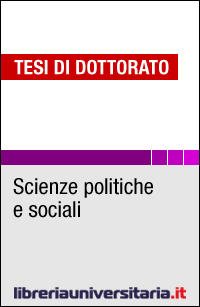
Child Rights in Europe: overview policy, role of the EU and Council of Europe
- Tipologia:
Tesi di master
- Anno accademico:
2009/2010
- Università:
Università degli Studi di Bologna
- Lingua:
- Inglese
- Pagine:
- 42
- Formato:
- Protezione:
- DRM Adobe
- Dimensione:
- 968.80 Kb
Descrizione Child Rights in Europe: overview policy, role of the EU and Council of Europe
Definition of the concept of "Child": persons under the age of 18 are considered to be children, as laid down in the UN Convention on the Rights of the Child (UNCRC). They make up one third of the world's population. Twenty years ago, the Convention on the Rights of the Child was adopted by the United Nations General Assembly. Its introduction into the international arena brought about a new vision of the child, recognizing that children are holders of their own rights and are neither the property of their parents nor helpless objects of charity. The Convention offers a vision of the child as an individual and as a member of a family and community, with rights and responsibilities appropriate to his or her age and stage of development. The Convention has played a major role in catalysing inspiration at domestic, regional and international levels. Its message has been reflected in many constitutions and child rights codes throughout the world, in addition to encouraging a rapid rise in the number of independent national institutions for children's rights, including children's ombudsman offices and commissioners for children. At present, the EU is not part to the UNCR and all Member States are bound to respect as they ratified it, however it has been a key source of inspiration for the European Union. The EU Charter of Fundamental Rights explicitly recognizes children's rights and reaffirms the obligations to act in the best interest of the child and to take children's views into account. Since the charter’s adoption in 2000 there have been several key children's rights policy developments within the EU. The EU is conscious of the fact that despite these and other policy accomplishments in the international arena much remains to be done. The reality for many children is alarming, as every year millions of children die from preventable causes, and experience discrimination, violence and exploitation, including child labour and involvement in hazardous work. Children continue to pay a heavy price for armed conflicts, poverty and insecurity. In a world full of promise, of new technologies, communication, wealth and opportunity, many children are still excluded and marginalized, never given the possibility to reach their full potential. For the EU, the key challenge now is to continue implementing the policies it has already adopted – giving children the central place they deserve and need in societies. I believe that by investing in children we lay the foundation for a world that cares and where passivity and indifference in front of human rights violations have no place. We know that by enabling children to participate, we are contributing to building stronger children, and that stronger children will be able to build stronger societies – and ultimately a better world! This presentation aims to make a complete picture of Children's Rights in European Policy, in particular the European Commission and Council of Europe. We will focus on legal basic rights of children: when the child rights appears for the first time in European documents? We will retrace the Treaty of Amsterdam, the European Charter of Fundamental Rights, until the Treaty of Lisbon and the Communication on the Right of the Child 2011-2014 to be launched in January 2011. We will describe in detail the contents of the policy on the rights of the child and how policies are implemented, using communications, studies and forums. We try to understand whether there is a European policy of children's rights. We will focus on implementation strategies, tools and on the various policy areas of Children's Rights in External and Internal Policy: Children in Development Cooperation, Children in Emergency and Crises Situations, Violence against children, Child Labor and Education, Child Poverty, Social Exclusion of Children and Asylum e Migration (Unaccompanied Minors) and Juvenile Justice. Finally, we will analyze the future prospects of Children's Rights after the entry into force of the Lisbon Treaty, the establishment of the European External Action Service (EEAS) and the High Representative for Foreign Affairs and Security Policy (HR) currently held by Catherine Ashton.


